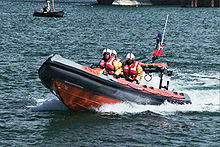Atlantic College
[3] Atlantic College was founded by Kurt Hahn, a German educationalist who had previously set up the Schule Schloss Salem and the Stiftung Louisenlund in Germany, Gordonstoun School in Scotland, and the Outward Bound movement.Hahn founded the college as a practical response to the search for new and peaceful solutions in a post-war world riven by political, racial and economic divisions.[7] On 19 September 1962, Atlantic College opened with nine teaching staff and 56 male students aged between 16 and 19 years from 12 countries; in 1967, the school became co-educational, with a cohort hailing from 35 nations.[24] Having already participated in these pilot exams in parallel to offering the British GCE A-Levels, in 1971 Atlantic College became the first school in the world to entirely abandon a national curriculum and qualifications in favor of the new program.[1][32][33] At the beginning of each year at the college, students are obliged to select 3 activities that they will each carry out for at least 2 hours a week as part of the International Baccalaureate's Creativity, Action, Service (CAS) requirement.[37] What was to become the world's most widely used type of craft for inshore rescue, the rigid inflatable boat (RIB), was originally conceived, designed, prototyped, tested, and built at the college under its founding headmaster, retired Rear-Admiral Desmond Hoare.[40][41][42] Students also participate in a range of activities that take advantage of the college's seafront location, including cliff abseiling, rock climbing, hiking, and sea kayaking.Before being purchased for use by the college by Antonin Besse, it was owned by William Randolph Hearst, who undertook major renovations, including transporting the roof and fireplace from the Bradenstoke Priory in Wiltshire and an ornate, gilded and vaulted ceiling from a church in Boston, Lincolnshire.[46] Students live in eight modern accommodation houses built in the castle grounds named after either ancient Welsh kingdoms, important individuals in the college's history, and benefactors: Powys, Whitaker, Gwynedd, Kurt Hahn, Antonin Besse, Pentti Kouri, Madiba, Tice, and Sunley.[47] Due largely to the college's setting at the castle, in combination with its reputation as a progressive institution, media sometimes use terms such as "Hogwarts for hippies" to describe the school.


Puerto RicoAtlantic College of Puerto RicoCollege of the AtlanticNewfoundland and LabradorCollege of the North AtlanticSt Donat's CastleLlantwit MajorCoordinatesIndependentboardinginternational schoolUnited World Collegesboarding schoolVale of Glamorganinternational curriculumInternational Baccalaureate Diploma Programmeliberal educationKurt HahnGermaneducationalistSchule Schloss SalemStiftung LouisenlundGermanyGordonstoun SchoolScotlandOutward BoundSir Lawrence DarvallDefence CollegeCold WarDesmond HoareRobert BlackburnSir Lawrance DarvallAlec PetersonInternational BaccalaureateThe Times of LondonLord Mountbatten of BurmaUnited World College of South East AsiaLester B Pearson United World College of the PacificCharlesNelson MandelaSouth AfricaQueen NoorJordanQueen Elizabeth IIInternational School of GenevaBritish GCE A-LevelsIvy LeagueDavis United World College Scholars ProgramInternational Baccalaureate'sCreativity, Action, ServiceAtlantic College Lifeboat StationAtlantic 21rigid inflatable boattsunamicastleBristol ChannelHeritage CoastlinegothicAntonin BesseWilliam Randolph Hearsttithe barncarbon neutralbiomassHogwartsPrince Philip, Duke of EdinburghLord MountbattenKing Charles IIIDiana, Princess of WalesEmperor AkihitoEmpress MichikoQueen BeatrixPrince ClausKing Willem-AlexanderQueen MáximaKing FelipeQueen LetiziaQueen Noor of JordanLester B. PearsonAlec Douglas-HomeHoward NewbyDavid CeperleyEyal OferWang GuangyaJorma OllilaSeppo HonkapohjaEdoardo AgnelliKari BlackburnAernout van LyndenHakeem Belo-OsagieDavid VoasGhaleb CachaliaFernando AlonsoCharles KutaUberto PasoliniJonathan MichieTim OwenOlivia Bloomfieldlife peerNick BrownDavid CunliffeJulie PayetteGovernor GeneralUlrich Meyer-BothlingHelen PankhurstJoão Pedro CravinhoKing Willem-Alexander of the NetherlandsEluned MorganLuke HardingMichiel van HultenElsie Effah KaufmannSaba Douglas-HamiltonJakob von WeizsäckerLouise LeakeyWangechi MutuHoratio ClareAndreas LoeweErik VardenTrondheimMaciej GolubiewskiConsul General of Poland in New York CitySally El HosainiE. Tendayi AchiumePrincess Raiyah bint Hussein of JordanJordanian royal familyLéa SteinackerPrincess Elisabeth, Duchess of Brabant